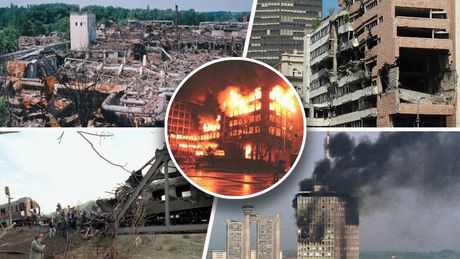89 innocent children died, now they would be in their prime: On this day in 1999, NATO bombing began

On this day, 24 years ago, the first sirens sounded that announced the NATO aggression against Serbia, i.e. what was then the Federal Republic of Yugoslavia (Serbia and Montenegro), and the first bombs fell.
The operation lasted from March 24 until June 10, 1999.
According to the data of the Ministry of Defense of Serbia, 2,500 civilians were killed during the NATO air aggression, among them 89 children and 1,031 members of the Army and the police. According to the same source, about 6,000 civilians were wounded, including 2,700 children, as well as 5,173 soldiers and police officers, while 25 people are still listed as missing. NATO's war losses in manpower and technology have never been revealed. Authorities in Belgrade at the time claimed that dozens of planes had been shot down, which was never confirmed.
There is almost no city in Serbia that has not been targeted during the 11 weeks of the aggression. NATO carried out 2,300 strikes and dropped 22,000 tons of missiles, including 37,000 banned cluster bombs and those loaded with depleted uranium. The consequences on the health of the population and the environmental are effectively impossible to measure. A sizeable portion of Serbia's infrastructure, business facilities, schools, health institutions, media outlets, cultural monuments, churches and monasteries were destroyed. About 50 percent of Serbia's manufacturing capacities and a third of the country's electricity producing capacity were destroyed.
Formally, the order to start the bombing, without the approval of the UN Security Council - which set a precedent - was issued to then commander of NATO forces General Wesley Clark by NATO Secretary General Javier Solana. Because they would have faced a veto by China and Russia in the Security Council, 19 NATO members decided to attack Serbia without the approval of the UN, but interestingly, even without the approval of their own parliaments, because many NATO countries would probably not have gotten that approval.
Clark later wrote in the book "Modern Warfare" that the planning of the NATO air operation against the SRJ was "largely in progress in mid-June 1998" and that it was completed at the end of August that year. According to Vladislav Jovanovic, the idea of bombing Serbia was already ten years old, since the time when Bob Dole promised independence to Pristina. Bill Clinton, then president of the United States, told a delegation of American Serbs that he, too, would not have signed what was offered to Slobodan Milosevic (to avoid the attack). A similar comment was later made by Henry Kissinger.
The first alleged reason for the bombing was that the Yugoslav delegation refused to sign the Rambouillet agreement, which seriously threatened the sovereignty of the Federal Republic of Yugoslavia, since NATO demanded entry into Kosovo and Metohija and freedom of movement throughout the country. At that time, a referendum on self-determination was planned, which later accelerated the secession of Kosovo and Metohija.
Another reason was to allegedly protect Albanians from ethnic cleansing, which was described as a humanitarian catastrophe, although it was later proven that the mass flight of Albanians from Kosovo started only after the bombing began.
The NATO aggression was preceded by offers from the international community. The bar of the demands was being raised daily, so that Serbia would be accused of not accepting an agreement.
The immediate reason to start the bombing was the event in Racak. A clash between police and the KLA ("Kosovo Liberation Army") members in the village of Racak on January 15, 1999, when William Walker declared the deaths of 45 KLA members as a massacre of innocent civilians. Finnish pathologist Helena Rante confirmed during the Hague trial of the former SRJ President Slobodan Milosevic that the tests determined there were traces of nitrate on the hands of those people, which indicated that they had been using firearms.
After the Serbian Assembly confirmed that it would not accept to allow foreign troops in Serbia, and proposed that United Nations forces monitor a peaceful resolution to the conflict in Kosovo and Metohija, NATO launched air strikes using cruise missiles and aircraft on March 24, 1999, at 7:45 pm, targeting several places in Serbia and Montenegro. 19 NATO countries started attacking from ships in the Adriatic, as well as from four air bases in Italy.
After difficult negotiations and pressure, the bombing ended with the signing of the military-technical agreement in Kumanovo on June 9, 1999. Ahtisaari, Chernomidin and Talbot gave Milosevic a new compromise proposal that called for an end to the war, provided that Serbian units and civilian administration withdrew from Kosovo and Metohija and gave way to KFOR. On June 3, 1999, the National Assembly of Serbia and the Government of the Federal Republic of Yugoslavia approved the deployment of about 45,000 soldiers. The signed agreement determined the withdrawal of the SRJ military and security forces from Kosovo and Metohija, and the establishment of UNMIK, the United Nations mission.
Since the secretary general of NATO issued an order to stop the bombing on June 10, 1999, the last bombs fell in the area of the village of Kololec (not far from Kosovska Kamenica), at 1:30 pm. It happened on the 79th day of the NATO aggression against Serbia (SRJ). On that day, the UN Security Council adopted Resolution 1244, and 37,200 KFOR soldiers from 36 countries were sent to the province, with the task of maintaining peace, security, as well as ensuring the return of refugees.
Video: Never before seen video of attack on army HQ in Belgrade: Marijana took it from 200 meters away
(Telegraf.rs)
Video: Treći dan sabora: Građani mogu da se informišu o pokretu, povoljnim kreditima za mlade
Telegraf.rs zadržava sva prava nad sadržajem. Za preuzimanje sadržaja pogledajte uputstva na stranici Uslovi korišćenja.

